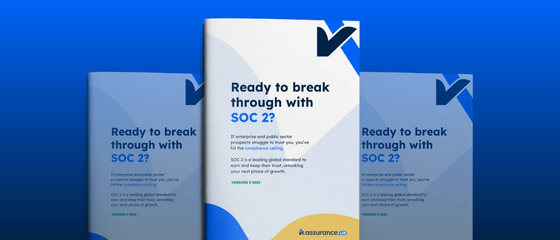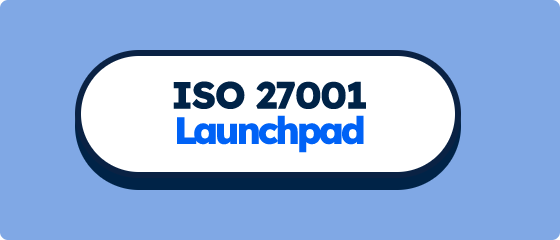.png)
The TL;DR of ISO 27001
ISO 27001, the international standard for Information Security Management Systems (ISMS), has evolved significantly over the years, as we move through 2024, understanding ISO 27001 and its relevance to modern businesses has never been more important.
ISO 27001, the international standard for Information Security Management Systems (ISMS), has evolved significantly over the years to address the growing challenges in information and cyber security. As we move through 2024, understanding ISO 27001 and its relevance to modern businesses—whether you’re a startup or an established enterprise—has never been more important.
What is ISO 27001?
ISO 27001 is a globally recognized standard that outlines the requirements for establishing, implementing, maintaining and continually improving an Information Security Management System (ISMS). This framework helps organizations manage the security of assets such as financial information, intellectual property, employee details and information entrusted by third parties.
ISO 27001 helps businesses systematically manage sensitive data, ensuring it remains secure and resilient against cyber threats. The standard applies to organizations of all sizes and industries, making it a critical component of a comprehensive cybersecurity strategy.
How does ISO 27001 work?
ISO 27001 provides a structured approach to managing information security through a risk-based process. It involves:
- Risk assessment: identifying potential security risks to the organization’s information assets
- Risk treatment: implementing controls to mitigate identified risks
- Continual improvement: regularly reviewing and updating the ISMS to respond to new threats and changes in the organization
The standard also emphasizes the importance of leadership commitment, employee awareness and a culture of continuous improvement to maintain and enhance security over time.
What’s new in ISO 27001:2022?
The ISO 27001 standard was updated in 2022 to better align with modern cybersecurity challenges. The 2022 version introduces several key changes, including an updated structure and new controls to address emerging threats.
One significant change is in the Annex A controls. In the ISO 27001:2022 version, the number of controls has been reorganized and reduced from 114 to 93, grouped into four new categories: Organizational, People, Physical and Technological. This reorganization helps businesses focus on the most relevant controls for today’s security environment, such as cloud security, threat intelligence and data masking.
How long should implementation take?
The time required to implement ISO 27001 can vary widely depending on the size and complexity of the organization. For small to medium-sized businesses, implementation might take anywhere from 3 to 6 months, while larger organizations might require 9 to 12 months or more. The key factors influencing the timeline include the current maturity of your information security practices, the resources dedicated to the project, and the complexity of your operations.
How long does the ISO 27001 certification process take?
Once your ISMS is implemented, the certification process typically involves a two-stage audit. The duration of this process depends on the organization’s size and readiness but generally takes between 2 to 4 months. After certification, regular surveillance audits are required to maintain compliance, with full recertification needed every three years.
How long is ISO 27001 certification valid?
ISO 27001 certification is valid for three years. During this period, your organization will undergo annual surveillance audits to ensure continued compliance. After three years, a recertification audit is required to renew the certification.
Does ISO 27001 require penetration testing?
While ISO 27001 does not specifically mandate penetration testing, it is strongly recommended as part of a comprehensive security strategy. Penetration testing helps identify vulnerabilities in your systems, allowing you to address them proactively. Including regular penetration tests in your ISMS can be an effective way to demonstrate your commitment to maintaining robust security controls.
Do I need ISO 27001 certification?
ISO 27001 certification is not legally required, but it offers significant advantages. For many businesses, especially those dealing with sensitive data or working with larger enterprises, ISO 27001 certification is a critical differentiator. It demonstrates to customers, partners and regulators that your organization takes information security seriously and follows internationally recognized best practices.
ISO 27001 Certification and startups
Startups should consider ISO 27001 certification, particularly if they handle sensitive information or aim to work with larger, security-conscious clients. Achieving ISO 27001 certification early in your business journey can set a strong foundation for growth, helping you avoid security pitfalls and build trust with customers from the outset. Check out our case study from Pyne, a Berlib-based startup who achieved ISO 27001 certification.
How important is ISO 27001 certification?
In today’s threat landscape, ISO 27001 certification is increasingly seen as a necessity rather than a luxury. It’s important not only for meeting regulatory requirements and customer expectations but also for building a robust defense against cyber threats. Whether you’re a startup looking to establish credibility or a large enterprise aiming to safeguard complex systems, ISO 27001 provides a proven framework for protecting your information assets.
How much does ISO 27001 certification cost?
The cost of ISO 27001 certification can vary widely based on the size and complexity of your organization and the level of existing security measures. Costs typically include consultancy fees, training, internal resources and the certification audit itself. For small businesses, the process might cost in the range of $10,000 to $30,000, while larger enterprises could see costs exceeding $50,000. However, the investment in ISO 27001 certification often pays off by reducing the risk of data breaches and enhancing customer trust.
If you’re ready to take the next step towards ISO 27001 certification or need guidance on implementing an ISMS, our team at AssuranceLab is here to help. Contact us today to learn how we can support your journey to certification and strengthen your organization’s information security posture in 2024 and beyond.







